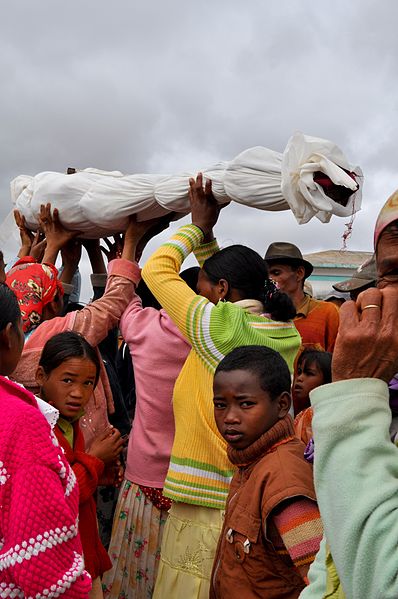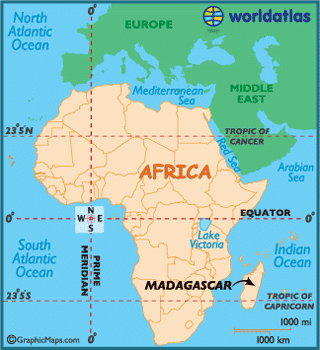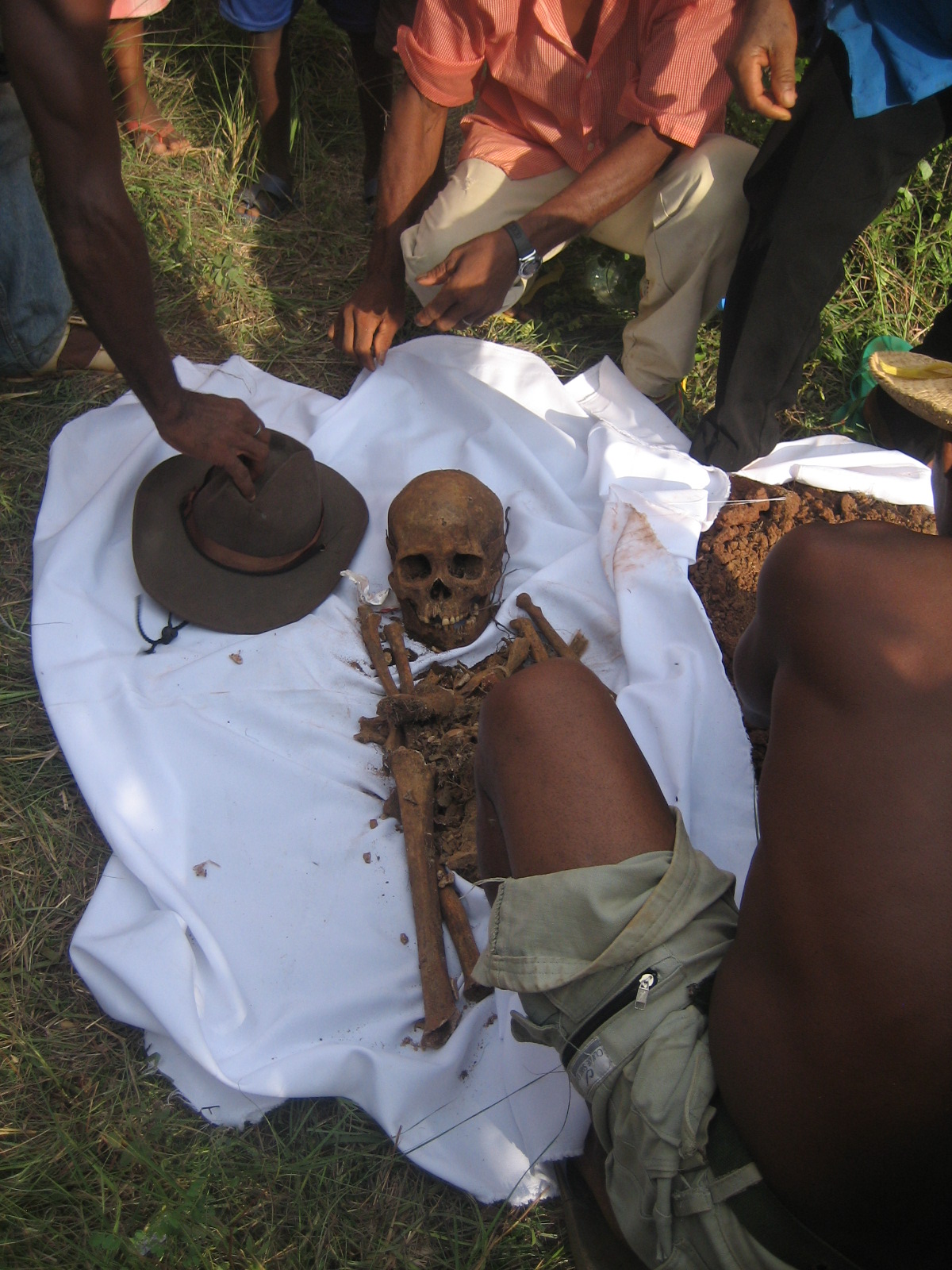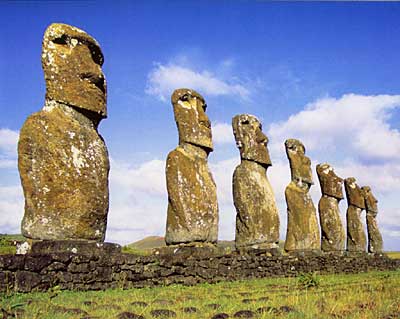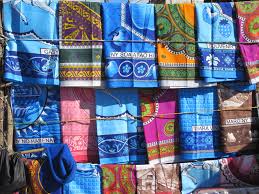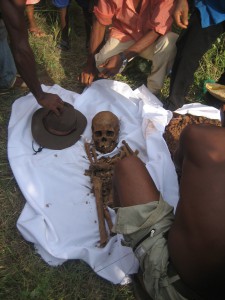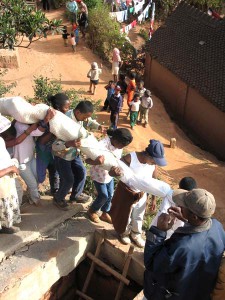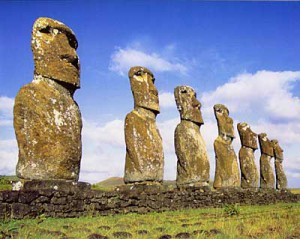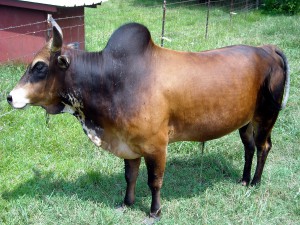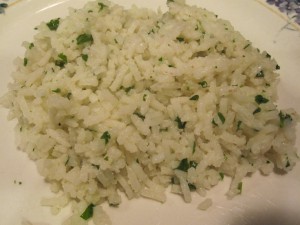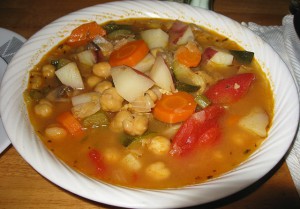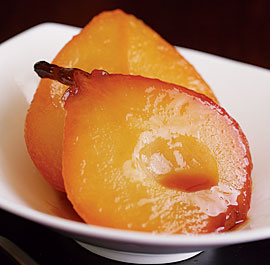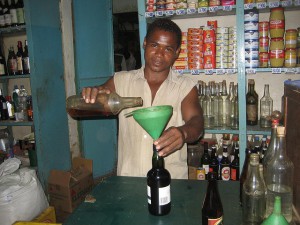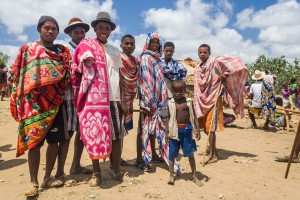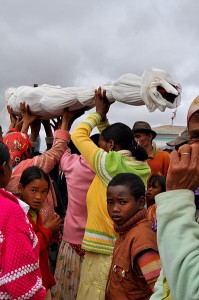Throughout this blog for our course on Death and Dying we will be posting information about Malagasy people, their culture, religion and spiritual practices surrounding death also known as Famadihana or the turning of the bones ceremony.
Definition of a Death Celebration
Celebration of Death – A cultural specific ritual of practice conducted to honour the dead either out of respect or the fear of ghostly retribution.
Famadihana Trailer
This trailer is an overview of the death ritual Famadihana! Check it out!
Folklore
While researching this topic, we found an ethnography by Dr. David Graeber about different experiences Malagasy people have that starts Famadihana:
“In September of 1990 I was talking with a woman named Irina about something an ancestor of hers had done some 60 years earlier. Like all the andriana or nobles of Betafo (a community to the north of the town of Arivonimamo, in Imerina, Madagascar) she was descended from a certain Andrianambololona, whose body, together with those of his wife and daughter and of three of his retainers, was buried in a large white tomb in the center of the village of Betafo, a five-minute walk across the rice fields from her house.
This particular ancestor, she was telling me, has long had the custom of appearing to his descendants in dreams to announce when the occupants of the tomb felt cold and needed to have a famadihana performed: that is, to be taken out and wrapped in new silk shrouds. When this happened in 1931, his descendants quickly gathered and organized the ritual. But, in their hurry perhaps, they forgot to exhume the bodies of the three retainers buried at the foot of the tomb somewhat apart from the rest. “The afternoon after they’d finished,” she said, “the town suddenly caught fire and burned to the ground. And the next morning he came once more to the person”-the individual who had originally had the dream-“and said, ‘If you don’t wrap us all, next time I’ll kill you outright .. .’ So they got the tombs ready again and rewrapped
them.'”
Madagascar and the Merina people
The population of Madagascar consists of 22 million people and the people inhabit it are known as the Malagasy people. There are 18 different ethnicities found throughout the country, some include the Bara, Betsileo, Tanala and the Merina, they are depicted below on the map in each of their respective territories. The dominant Merina group represent about five million people of the total population and they speak in the Malagasy dialect as well as in English and French. The Malagasy Merina langauge however is used primarily throughout their education system and is therefore more prominently used. The Merina population consist of mostly middle-class individuals and families and their economy is based on the cultivation of rice. cassava, potatoes, onions and the raising of livestock such as cattle and pigs.





The ariary is the currency used in Madagascar. One ariary is equivalent to 0.00035 US dollars.

Customs of Famadihana
- Famadihana is held every 7 years and is considered the link between the living and the dead.
- Ancestors are taken from the family tomb by family members. They are then unwrapped and placed into a new lambamena and wrapped up again. Family members will then start the celebration that includes dancing with the bodies of the ancestors before being placed back into the family tomb.
- The family will also have to provide drinks and food for all that attend.
- It is considered a serious omen if you do not celebrate Famadihana, especially if you are financially able to do so.
- Anybody in the community is allowed to attend.
- The festival starts with town officials and family elders chanting the national anthem while standing on top of the family tomb.
- The festival is based on the belief that the spirit of the dead can only pass on into the afterlife after their body has been completely decomposed.
- A lambamena or large silk shroud is replaced every 7 years to show respect for the dead because they are still viewed as members of the living.
- The dead are referred to as gods on earth and are considered the most important and authoritative members of the family.
- The burial tomb is the primary link between the living and the dead and are kept in the family for eternity.
- The land that the family tomb is located on is referred to as tanindrazana meaning land of the ancestors. This land is sacred and social and economic practices are designed to guarantee that this land will remain with the family for an eternity.
Malagasy Spirituality and Religion
- 2/5 of the population practice the indigenous religion, which is based upon ancestors beliefs and practices. This is the equivalent of Aboriginal spirituality in Canada.
- They believe in the existence of a supreme being known as Zanahary.
- Vazimba were originally viewed as the first inhabitants of Madagascar. They held god-like status because of their spiritual powers and unexplainable existence.
- Now, the term Vazimba refers to the ghosts of people who were unfortunate. These spirits are viewed as dangerous and angry because they have been cut off from proper relations with their descendants.
- Descendants will turn into Vazimba if the family does not properly care for the family tomb and they stop conducting Famadihana every 7 years.
- Almost half of the population now practices some form of Christianity and 1/5 are Roman Catholic.
- The conversion to Christianity and other religions has not eliminated the traditional practices regarding death.
- Famadihana is practiced regardless of religion.
Malagasy food vs. North American Culture
Everyone knows that no family holiday celebration is complete without discussion in between bites of food surrounded by family and friends celebrating the holidays, birthday or just having the opportunity to reconnect with loved ones. Though the dishes prepared in Madagascar may seem bizarre and taboo compared to the typical meals such as hot dogs and hamburgers within the North American Culture, there is one thing that stays the same food is apart of every celebration whether it be the celebration of the day of birth or the celebration of the life of a pasted on ancestor. Food is the center of every cultural gathering.
Malagasy food during Famadihana include:
- Zebu Meat (A hump-back type of cattle)
- Rice with Laoka (A mixture of rice with tomato and coconut sauce)
- Stews
- Laopsy Soup (A vegetable soup consisting of radishes, string beans and carrots)
- Traditional Madagascar Desserts (Carmelized Pears and other pasteries)
Malagasy drinks include:
- Hand-crafted Rum (Rum is the main drink of choice during the Famadihana celebration)
- Hand-crafted Beers
Compared to…
North American food during Celebrations which can usually include:
- Main course meat such as Turkey or Ham during most holidays
- Hotdogs
- Hamburgers
- Salad
- Desserts such as cake, brownies or cupcakes
North Americans drinks include:
- Juice boxes for children
- Carbonated beverages such as Pop and Sparkling water
- Beer and Wine
- A multitude of Liquors such as Rum, Vodka, Gin and Whiskey.
Malagasy Clothing
- Lamba- simply means clothes. It is a large rectangle garment that is wrapped around the body.
- The colour, print and type of fabric varies from region to region.
- Malagasy men will wear these to ceremonies such as Famadihana, whereas women tend to wear these more on a regular basis.
- The largest of the Lamba’s is known as a Lambamena. It is a very large silk shroud that is used to wrap the bodies of the deceased before placing them into the family tomb.
- This shroud is replaced every 7 years as part of the Famadihana festival.
The National Anthem of Madagascar
The national anthem of Madagascar is sung each time on the tombs of the dead before the celebration of Famadihana begins. It is typically sung by the town officials and by family members of the deceased. Below is a video of their national anthem with it’s English translation following.
English Translation:
Oh, Our beloved fatherland
Oh good Madagascar.
Our love for you will not leave,
For you, for you for ever.
CHORUS:
Bless you, oh Creator
This island of our ancestors
To live in peace and joy
Hey! We are truly blessed.
Oh our beloved fatherland!
We wish to serve you with
The body and heart, spirit that is ours,
You are precious and truly deserving.
Chorus
Oh our beloved fatherland!
We wish that you will be blessed,
So that the Creator of this world
Will be the foundation of your laws.
Chorus
